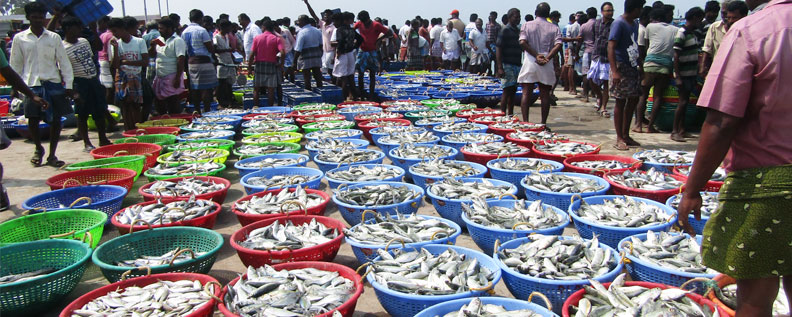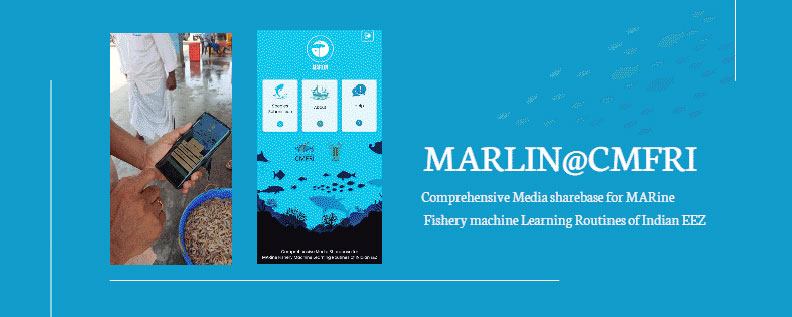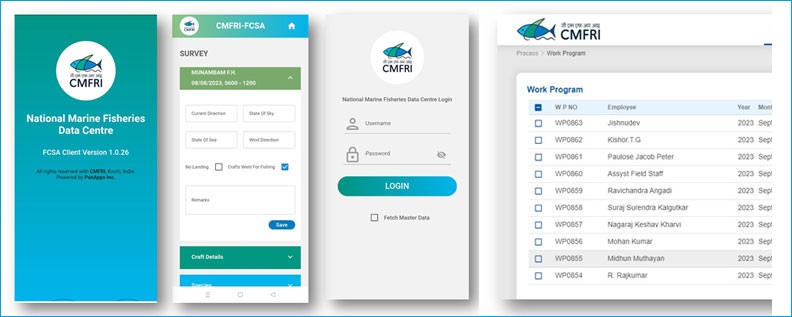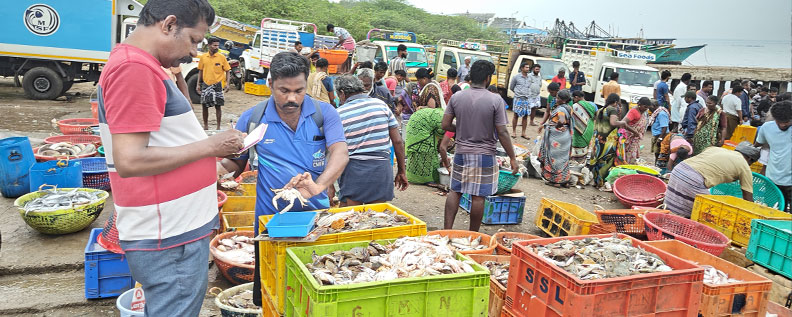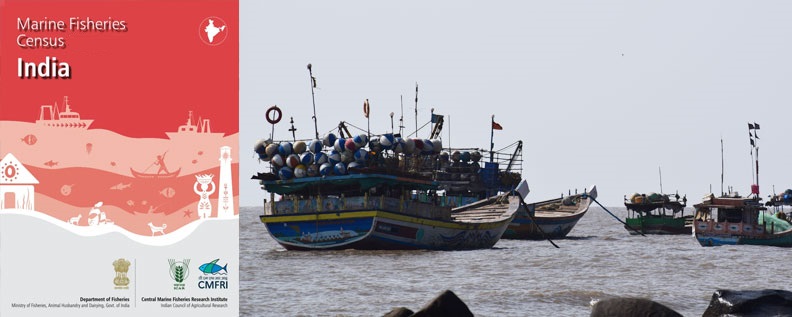- Thrust Areas of Research
-
Major Achievements
- The development and refinement of National Marine Fishery database using “Stratified Multistage Random Sampling”, a method unique to India. With this methodology, the Institute is continuously updating and maintaining the national marine fisheries database since 1950, which comprises data of more than 1200 species landed along the entire coast. This information forms the vital input for fish stock assessment periodically carried out by the Institute to develop management measures for sustained marine fish production. Also, data form the database is used by policy planners, fishery managers, sea food exporters and research organizations.
- Conducts the National Marine Fisheries Census and developed a comprehensive census database published in the form of 11 reports (10 with respect to the 9 maritime states, one Union Territory and one summary report). These data are widely consulted by all the maritime states, government and non-government organizations involved in fisheries research.
- Carried out Stock Assessment of different commercially marine fish species using six decades data (1950-2010) on landings by classifying the resources into 26 groups on a national level revealed that 18 resources groups fall under ‘abundant’ class, 5 fall under ‘less abundant’ class and 1 each fall under ‘declining’, ‘depleted’ and ‘collapsed’ classes.
- Derived Potential Yield and Optimum Fleet Size for the maritime states West Bengal, Orissa, Andhra Pradesh, Tamil Nadu, Puducherry, Kerala, Karnataka, Goa, Maharashtra and Gujarat as part of the task assigned by the committee constituted by the Ministry of Agriculture.
- Developed the national database on marine fishery resources with information on species wise, gear wise and fishing zone wise landings and fishing effort. Digitized historical information on catch and effort of marine fishery resources.
- Developed Computer Software for processing marine fish landings data, estimation of individual species level landings and exporting of information into RDBMS database. Also, statistical tools were developed for time series forecasting, stock assessment, multivariate analysis and optimization using genetic algorithm.
- Fish Watch- a new system of field information dissemination on a near real time basis. The fish landing figures and landing centre price range of important resources at 6 major fishing harbours of the country published as “Fish Watch” in the CMFRI website on a daily basis since 2010.
- Trawl ban- Data on marine fishery resources FRA datasets and inputs from all capture fisheries divisions of CMFRI in association with other research organizations and associations /NGOs are able to restrict the mechanized fishing operations for some period in the territorial waters of states on both the coasts and the Ministry of Fisheries, Govt. of India is able to successfully implement the ban in the EEZ.
- Management advisories/Policy Documents were developed for maritime states such as Kerala, Karnataka, Andhra Pradesh, Maharashtra, Gujarat and Tamil Nadu helping in sustainable development of marine fisheries in these states.
- Using catch and effort time series of four categories of marine fishery resources, possible influence of fishery regulations like trawl ban was studied for all the maritime states of the country for the committee constituted by the Ministry of Agriculture to review the centrally implemented fishing regulations along east and west coast of the country.
-
Technology or Concepts Developed
- National database on marine fishery resources with information on species wise, gear wise and fishing zone wise landings and fishing effort. Digitized historical information on catch and effort of marine fishery resources.
- An online system for the collection and retrieval of data on marine fish landings and other related parameters named Fish Catch Survey and Analysis (FCSA)
- Developed a well-balanced, quick-to-compute and regularly implementable measures that would assess the stock health of all or important resources that form the fishery viz., EPI- FSS and Fortified FSS using vulnerability indices of resources, which are supported by other indicators like the weighted mean trophic level index.
- An R package named FESta for the standardization of fishing effort.
- Database on Economics of different marine fishing methods, Valuation of marine fish landings, Private capital formation in Indian Fishing Industry and spatio-temporal prices of commercially traded fisheries
- EBRFM based communication tools –Video Film on Low carbon fishing
- A comprehensive methodology for assessment of Gender Mainstreaming in marine fisheries sector.
- A multidimensional scale of measuring the effectiveness of Self Help Groups in marine fisheries sector
- A movie on Success story of Women’s Self help groups in marine fisheries sector as a component of ICT Module in Gender (an interactive multimedia cyber extension package).
- A fish market grid for selected markets in coastal Kerala
- Value chain approach for developing Carbon budgeting in marine fishing operations
-
Ongoing Research Projects
SI.No. Project Code Project Title Principal Investigator Project Period 1 FRAEED/GIS/01 Geo-referenced Marine Fisheries Resources Information System for Indian EEZ based on Enhanced Survey Protocols and Methodological Platforms for Stock Assessment, Modelling and Forecasting Dr. J. Jayasankar 2024-2029 2 FRAEED/CV/02 Automated System for Marine Fishery Resources Landing Data Collection via Computer Vision and AI-Driven Deep Learning Algorithms for Species Identification and Quantification from Visual Images Dr. Eldho Varghese 2024-2029 3 FRAEED/LIV/03 Assessing the livelihood status of marine fisherfolk in India: A sustainable livelihoods approach Dr. N. Aswathy 2024-2027 4 FRAEED/GEN/04 A comprehensive praxis on trans-inclusive gender mainstreaming through the paradigm of sustainable livelihoods in Indian fisheries sector Dr. Vipin Kumar V.P. 2024-2027 5 FRAEED/ETS/05 Economics, Trade and Stakeholders in Indian Marine Fisheries Sector: A Policy Outlook (ETS-PO) Dr. Shyam S. Salim 2024-2029 6 FRAEED/ABA/06 Decision-making Process in Sustainable Marine Fisheries Stewardship: Applications of Behavioural Approaches Dr. C. Ramachandran 2024-2027 -
Scientific Staff
No Name Designation 1 Dr. J. Jayasankar Principal Scientist & Head, FRAEED 2 Dr. S. S. Raju Principal Scientist 3 Dr. R. Narayana Kumar Principal Scientist & SIC, Madras RS 4 Dr. Ramachandran C. Principal Scientist 5 Dr. Swathi Lekshmi P. S. Principal Scientist & SIC, Veraval RS 6 Dr. Somy Kuriakose Principal Scientist 7 Dr. Vipinkumar V. P. Principal Scientist 8 Dr. Shyam S Salim Principal Scientist 9 Dr. K. G. Mini Principal Scientist 10 Dr. J. Charles Jeeva Principal Scientist 11 Dr. Aswathy N. Principal Scientist 12 Dr. Shinoj P. Principal Scientist 13 Dr. Johnson. B. Senior Scientist 14 Dr. Eldho Varghese Senior Scientist 15 Dr. Vinaya Kumar Vase Senior Scientist 16 Dr. Anuja A. R. Scientist
Explore CMFRI
- About Us
- What We Do
- Our Locations
- Knowledge Centres
- Others

